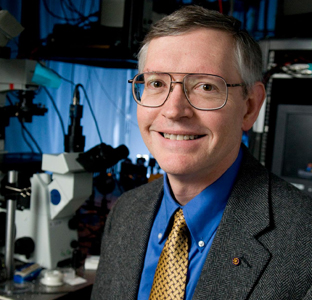UTSA hosts President’s Distinguished Lecture featuring Nobel laureate William E. Moerner, Sept. 11


(Sept. 8, 2015) — UTSA President Ricardo Romo will present a President’s Distinguished Lecture featuring 2014 Nobel Laureate William Esco Moerner, Ph.D. at 10 a.m. on Friday, Sept. 11 at the UTSA Main Campus in the Main Building Auditorium (MB 0.104). A reception will immediately follow the lecture, which is free and open to the public.
Moerner shared the 2014 Nobel Prize in Chemistry with American Eric Betzig and Germany’s Stefan W. Hell for developing super-resolved fluorescence microscopy. The technique, which allows scientists to observe and track single molecules in live cells using fluorescence, has revolutionized cell biology studies by allowing researchers to look at cells more closely than ever before. The method also has significant applications to the advancement of drug discoveries.
A 1971 graduate of San Antonio’s Thomas Jefferson High School, Moerner played in Jefferson’s band and was a member of a number of after-school clubs related to science, languages, radio, speech, debate and writing.
Following high school, Moerner earned three bachelor’s degrees – in physics, electrical engineering and mathematics -- from Washington University in St. Louis before continuing to earn his master’s and doctoral degrees at Cornell University.
In the 1980s, Moerner began his career as a scientist in the IBM Research Division in San Jose, Calif. He also served on the faculty at the University of California, San Diego before joining Stanford University in 1998. Currently, he is Stanford’s Harry S. Mosher Professor of Chemistry and a professor of applied physics, where he researches physical chemistry, chemical physics, single molecule biophysics, super-resolution imaging nanoparticle trapping.
To date, Moerner has authored or co-authored nearly 350 publications, holds 12 patents and has three applications pending in optics and physical chemistry.
Moerner will be honored by San Antonio’ health care and biomedical sector on Sept. 10 with the 2015 Julio Palmaz Award for Innovation in Healthcare and the Biosciences. The award is given to one individual each year that has put novel ideas into action with tangible, transformational results.
Notably, Moerner is the second Jefferson graduate to win the Nobel Prize for Chemistry, following Robert Floyd Curl, Jr., a 1950 graduate who earned the prize in 1996 for helping to discover fullerenes, a family of specialized carbon molecules.
-----------------------------
Learn more about the UTSA Department of Chemistry.
Learn more about San Antonio’s health care and biomedical sector.
Connect online with UTSA on Twitter, Facebook, YouTube and Instagram.
Events
The UTSA Office of Undergraduate is proud to celebrate National Undergraduate Research with an annual event sponsored by the (OUR) featuring students will showcase undergraduate student research and creative endeavors from all disciplines across campus.
Various LocationsDía en la Sombrilla, formerly Fiesta UTSA, is a festival hosted each spring as a part of Fiesta® San Antonio events. Sponsored by Roadrunner Productions, the event features music, food, confetti, games, event t-shirts, and more.
Sombrilla Plaza and Central Plaza, Main CampusFiesta Arts Fair features contemporary art from more than 100 artists from across the U.S., Fiesta favorite foods, drinks, live music by local and regional performers, and a Young Artists Garden providing opportunities for budding artists to learn, explore and express their creativity.
UTSA Southwest CampusJoin the PEACE Center and Wellbeing Services for Denim Day, a day of learning about the importance of consent and why we wear denim on the last Wednesday of the month each April during Sexual Assault Awareness Month. Stop by our Denim Day display to take a photo in front of our Denim Wall, spin the "Is It Consent?" Wheel, and get a Concha or goodie.
Student Union Window Lounge, Main CampusLearn to use Zotero®, a citation manager that can help you store and organize citations you find during your research. Zotero can generate bibliographies in various styles, insert in-text citations and allow you to share sources with collaborators.
Virtual EventThis event is to achnowlege the graduating seniors and induct the new cohart of scholars to our program.
North Paseo Building (NPB 5.140,) Main CampusCelebrate the accomplishments of College of Education and Human Development, College for Health, Community and Policy, College of Sciences and University College.
Alamodome

